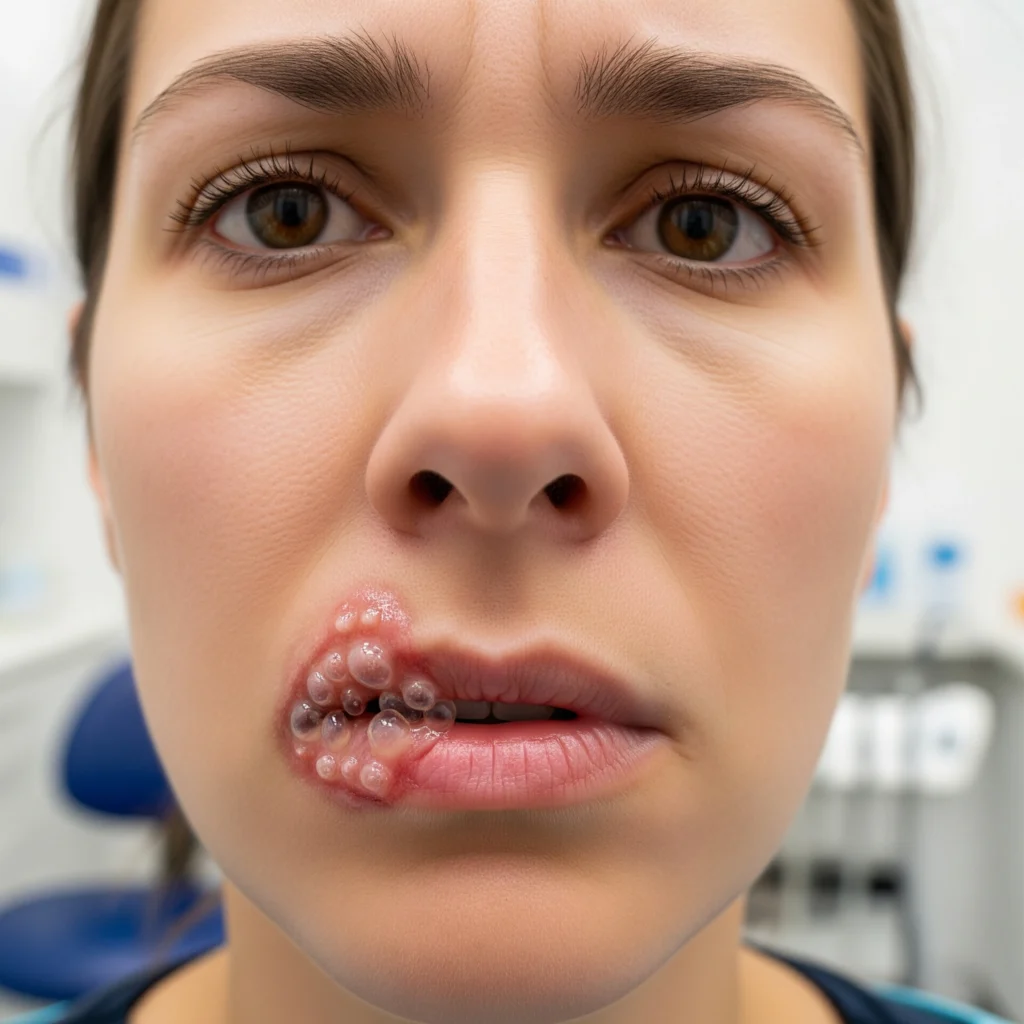Herpes Simplex Virus (HSV) – Cold Sores are a widespread viral infection marked by painful, fluid-filled blisters that usually develop on or near the lips.These sores can cause discomfort, affect daily activities such as eating and speaking, and often reoccur due to various triggers. Understanding the causes, symptoms, and effective treatments for cold sores helps in managing outbreaks and minimizing their impact on your life.
Herpes Simplex Virus (HSV) – Cold Sores mainly result from the herpes simplex virus type 1 (HSV-1), although type 2 (HSV-2) can also cause oral sores, especially in cases of oral-genital contact. After the initial infection, the virus remains dormant within nerve cells and can reactivate later.
Common triggers for cold sores outbreaks include:
Therefore, managing these triggers can reduce the frequency and severity of outbreaks.

Timely detection of cold sores is crucial for beginning treatment without delay.The initial phase, known as the prodrome, often includes itching, tingling, or burning sensations around the lips. These symptoms usually appear 24 to 48 hours before the blisters develop.
Following this phase, small, fluid-filled blisters emerge, usually clustered together. These blisters can be painful and may burst, leaving shallow ulcers that crust over and heal within 7 to 10 days. Sometimes, individuals experience additional symptoms such as mild fever, swollen lymph nodes, and general malaise during the first outbreak.
By recognizing these signs early, affected individuals can seek treatment to alleviate symptoms and possibly shorten the healing time.
Cold sores are mainly transmitted through direct contact between skin surfaces.This means kissing or sharing personal items like lip balm, utensils, or towels during an active outbreak can transmit the virus.
Importantly, the virus can still be contagious even when no visible sores are present, through a process called asymptomatic viral shedding. Therefore, preventive measures are essential to avoid spreading or catching the infection.
To reduce transmission and outbreaks:
Following these prevention tips can significantly lower cold sore flare-ups and spread.
Although there is no permanent cure for Herpes Simplex Virus (HSV) – Cold Sores, several treatment options can help manage symptoms and speed up healing.
Antiviral Medications
Antiviral medications like acyclovir, valacyclovir, and famciclovir work best when taken early during an outbreak.These medications work by inhibiting viral replication, reducing the duration and severity of symptoms. Dentists and doctors commonly prescribe these for frequent or severe cases.
Over-the-Counter Remedies
Topical antiviral creams are available without prescription and can relieve pain and inflammation if applied at the first sign of a cold sore. Additionally, numbing agents like lidocaine may ease discomfort.
Home Care and Natural Remedies
Applying cold compresses can reduce swelling and soothe pain. Using moisturizing lip balms helps prevent cracking and further irritation. Aloe vera gel and honey also possess soothing and healing properties.
Lifestyle Support
Maintaining good hydration and consuming a nutrient-rich diet can strengthen your immune defenses. Avoiding spicy or acidic foods during an outbreak minimizes pain.
By combining medical treatments with supportive care, healing can be more comfortable and quicker.
Many individuals experience recurrent cold sores throughout their lives. Although outbreaks cannot be completely eliminated, adopting healthy lifestyle habits can minimize their frequency.
Stress management is particularly important, as emotional strain is one of the top triggers for viral reactivation. Regular exercise, mindfulness practices, and sufficient rest support overall wellness. Additionally, using SPF lip balms shields your lips from sun exposure and helps prevent UV-triggered outbreaks.
If you suffer from frequent or severe cold sores, your healthcare provider may recommend daily suppressive antiviral therapy to decrease outbreak frequency and reduce viral shedding.
Routine dental visits at reliable clinics like Unidental promote good oral health by identifying issues early and offering tailored treatment plans.
While most cold sores heal independently, certain situations require medical attention:
Consulting a dentist or doctor promptly ensures you receive appropriate treatment, minimizing discomfort and complications.
Herpes Simplex Virus (HSV) – Cold Sores are a common, manageable condition that many people experience. With a clear understanding of triggers, symptoms, and treatments, you can control outbreaks and reduce discomfort. Maintaining a healthy lifestyle and practicing good oral hygiene are essential for prevention and care.
For personalized diagnosis and expert treatment, visit Unidental, where compassionate care and advanced therapies come together to support your oral health and well-being.
They are highly contagious, especially during blister formation and healing. The virus can spread through direct contact or sharing personal items.
Although you cannot eradicate the virus, avoiding triggers like stress, sun exposure, and fatigue helps reduce outbreaks.
Typically, cold sores heal within 7 to 10 days, especially with early treatment.
Mild cases respond well to home care, such as cold compresses and lip moisturizers, but severe cases need antiviral medications.
A healthy diet rich in vitamins, especially vitamin C and zinc, supports immunity and may reduce the frequency of outbreaks.
Hyderabad : +91 6305 971445
Anantapur: +91 70758 90089
Goa: +91 83266 32500
Mon to Sat 10:00AM to 8:00PM
Sun 10:00AM to 12:00PM
Lorem ipsum dolor sit amet, consectetur adipiscing elit. Ut elit tellus, luctus nec ullamcorper mattis, pulvinar dapibus leo.

Our goal is to provide friendly, caring dentistry with the highest standards in general, cosmetic, and specialist treatments. We strive to be the best dental hospital for comprehensive oral care.
We use advanced dental technology to deliver safe, precise, and painless treatments for every patient.